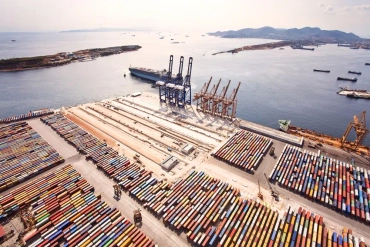
Rotterdam Port taps central Europe potential via rail



Rotterdam Port expanding reach into central Europe
Rotterdam Port is moving to maintain its status as Europe’s biggest port. Even as it improves the efficiency of Dutch customs inspection procedures, retaining its throne also requires developing its ocean freight and railway transportation competitiveness. Amid increasing competition from neighboring ports, it now requires new terminals to use its expanded on-dock rail facilities. It’s part of its plan to extend its rail transport presence into the central European hinterland to acquire new markets.
Of the 12 million 20-ft equivalent units handled by Rotterdam Port, only 11% of those travel by rail. This figure highlights the growth potential of rail transport in and around the port. However, there are difficulties and obstacles that come with such a development. European shippers have been unwilling to transport goods via train. That’s largely due to the delays that come with switching trains and crews every time you cross a border. As such, most shippers usually choose barge or road transport to move their cargo.
“If a train crosses a border you have to change the locomotive because it’s country specific. You have to change the driver because he has to speak the language of the country he’s entering,”
– Peter ten Broek, Rotterdam Port’s business manager of logistics for containers and breakbulk
What the new regulation requires
All new terminals opening at Maasvlakte II must now transport half its cargo via containerized rail. At this moment, there are three terminals operating within the MII site, with 325 hectares left for development. It’s unclear how this requirement will pan out since so far, 35% of the facility’s cargo is transported by train at best.
Effect on Rotterdam Port
This new obligation is a way with which Europe’s top container port can maintain its status. Volume through the port fell 2.3% year on year to 6.1 million TEUs in the first half of 2016. With an increased use of its railways, it hopes to ease port congestion from the increasing arrivals of megaships.
Rotterdam Port touts its rail transport as “fast, efficient, reliable and sustainable”. Rail cargo can reach the German border in under three hours, and many other European destinations within a day. Currently, it handles some 250 weekly rail connections. Of the cargo it handles, 53% is handled by truck and some 36% by barge. But in order to attract cargo heading eastward and to southern Germany, goods transporting through Rotterdam should ideally go via rail. But crucially, these are areas that the neighboring ports of Antwerp and Hamburg are also eyeing.
“We don’t often use rail because of delays at the border. When it comes to door deliveries, the final journey needs to be trucked. Redelivery of the container back to the terminal is also an issue. Carriers often don’t want them at a rail terminal.” – Frank van den Berg, Managing Director, iContainers Netherlands BV
Rail development in action
Europe’s biggest port is clearly working to improve its accessibility amid increasing competition by neighboring Antwerp and Hamburg.
Already, there’s the Betuweroute, a dedicated railway going from Rotterdam to Germany. It’s heavily marketed to shippers as a source of transport which allows cargo to reach the German border in under three hours. That’s in comparison to an 18-hour barge journey to Duisburg in western Germany.
Earlier this year, the Europe Container Terminals (ECT) and TX Logistik launched the express Rotterdam-Bayern service. This led to a 50% increase in traffic with southern Germany, even robbing business from Hamburg and Bremerhaven. Despite the similar transit times, an increasing number of shipping lines are opting for Rotterdam as their European port of call.
Already, the Rotterdam Port is planning a 275 million euro project to redivert some 2.5 miles of rail track from a bridge. That’s to prevent rail and shipping traffic to “get in each other’s way”, as a result of the increasing demand for the route connecting the port with Germany’s rail network. City officials have also launched an intermodal rail shuttle to and from the port on the line. It’s looking to make existing movements to and from Rotterdam more efficient.
This is all on top of the recently-launched China-Netherlands rail transport service, which connects China’s Chengdu City to Rotterdam Port. The “Chengdu-Tilburg-Rotterdam Express” provides door-to-door services in 15 days. It provides connections stretching as far as Shanghai, Vietnam, and even South Korea.
Rail transport central to future of Rotterdam Port
Developing the rail transport system in and around Rotterdam will be key to the port’s competitiveness. Extending its reach and efficiency to the potential that lies in the hinterlands of central Europe will certainly boost its presence.
“By sea, Rotterdam is already the most important European destination of Chinese cargo. Thanks to this shuttle, we are now also adding a fast connection by land. We strongly believe in this concept, partly because a large part of Europe can efficiently be reached via the excellent short sea connections from Rotterdam. And vice versa, of course.” – Allard Castelein, CEO of Rotterdam Port Authority
Related Articles


